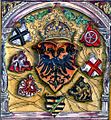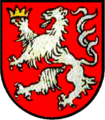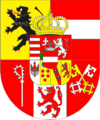Prince-elector facts for kids
The Prince-electors were a special group of powerful princes in the Holy Roman Empire. Their main job was to choose the Holy Roman Emperor. Think of them as the people who voted for the leader of a very large and old European empire.
From the 1200s onwards, these Prince-electors had the important job of picking the next Emperor. For a long time, the chosen Emperor also needed to be crowned by the Pope. But after 1508, just being elected by the Prince-electors was enough to become Emperor. Charles V was the last Emperor who was crowned by the Pope in 1530. After him, Emperors were just elected.
Even though the Electors chose the Emperor, from 1440 onwards, almost all Emperors came from the House of Habsburg, a powerful Austrian family. So, the Electors often just confirmed the Habsburg family's choice.
Being a Prince-elector was a very important and respected position, second only to being a King or Emperor. They had special rights that other princes in the Empire didn't have. They also kept their original titles, like Duke or Count. The son who was next in line to become a Prince-elector was called an electoral prince.
Contents
Who Were the Electors?
The Prince-electors were a small, powerful group. They were the only ones who could vote for the Holy Roman Emperor. This made them very important figures in the Empire.
The Seven Original Electors
For a long time, there were seven Prince-electors. These seven were set in stone by a very important law called the Golden Bull of 1356. This law made sure that the election process was clear and avoided arguments.
The seven original Electors were:
- The three most important Archbishops (religious leaders):
- The Archbishop of Mainz
- The Archbishop of Trier
- The Archbishop of Cologne
- Four powerful secular (non-religious) princes:
- The King of Bohemia
- The Count Palatine of the Rhine
- The Duke of Saxony
- The Margrave of Brandenburg
Why These Seven?
These specific rulers were chosen because they were very powerful and influential. The Archbishops were important religious figures, and the other four rulers controlled large and wealthy territories. Their combined power helped keep the Empire stable.
The Emperor's Election
The election of the Holy Roman Emperor was a grand and formal event. It usually happened in the city of Frankfurt.
How the Vote Worked
When a new Emperor needed to be chosen, the Electors would gather. They would discuss and then cast their votes. The person who received the most votes became the new Emperor. This system was unique because it meant the Emperor wasn't just born into the role; he was chosen.
Special Roles of the Electors
Each of the seven Electors also had a special ceremonial role during the Emperor's coronation. These roles were:
- The Archbishop of Mainz was the Arch-Chancellor of Germany.
- The Archbishop of Trier was the Arch-Chancellor of Gaul and Arles.
- The Archbishop of Cologne was the Arch-Chancellor of Italy.
- The King of Bohemia was the Arch-Cupbearer.
- The Count Palatine of the Rhine was the Arch-Steward.
- The Duke of Saxony was the Arch-Marshal.
- The Margrave of Brandenburg was the Arch-Chamberlain.
These roles showed their high status and importance in the Empire.
Changes Over Time
The number of Electors changed a few times throughout history. New electorates were sometimes created, and old ones sometimes lost their status.
Adding New Electors
Over the centuries, more Electors were added. For example, in the 1600s, the Duke of Bavaria became an Elector. Later, the Duke of Brunswick-Lüneburg (who later became the King of Great Britain) also became an Elector. This meant there were sometimes eight or nine Electors instead of seven.
The End of the Electors
The role of the Prince-electors came to an end in the early 1800s. In 1803, many changes happened in the Holy Roman Empire, partly because of Napoleon Bonaparte. The number of Electors changed again, and some new ones were created, like Württemberg and Salzburg. However, the Holy Roman Empire itself was dissolved in 1806. With the Empire gone, the Prince-electors no longer had a role.
Images for kids
-
The emperor Maximilian surrounded by shield of electorates
-
Kingdom of Bohemia. The white lion holds a crown, showing the King of Bohemia as the Arch Cupbearer.
-
In 1777, the number of Electors dropped from nine to eight. Then in 1803, Württemberg became an electorate thanks to Napoleon.
See also
 In Spanish: Príncipe elector para niños
In Spanish: Príncipe elector para niños







